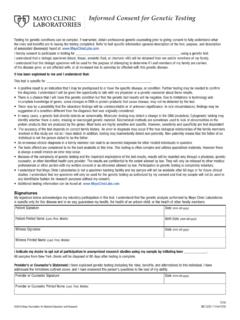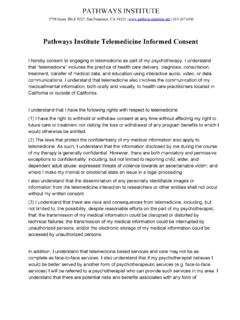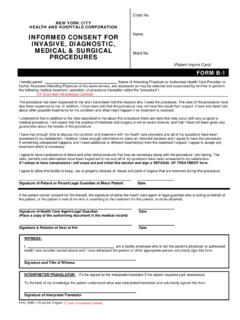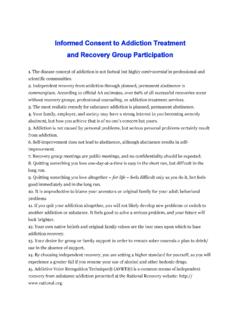Transcription of NTI-DDS Informed Consent - ChairsideSplint.com
1 Informed Consent FOR ORAL APPLIANCE USE FOR THE TREATMENT OF SLEEP DISORDERED BREATHING You have been diagnosed by your physician as requiring treatment for sleep-disordered breathing (snoring and/or obstructive sleep apnea). This condition may pose serious health risks since it disrupts normal sleep patterns and can reduce normal blood oxygen levels that may result in excessive daytime sleepiness, irregular heartbeat, high blood pressure, heart attack or stroke. Oral appliance therapy for snoring/obstructive sleep apnea assists breathing during sleep by keeping the tongue and jaw in a forward position during sleep. Oral appliance therapy has effectively treated many patients. However, there are no guarantees that it will be effective for you, since everyone is different and there are many factors that influence the upper airway during sleep.
2 It is important to recognize that even when the therapy is effective, there may be a period of time before the appliance functions maximally. During this time you may still experience the symptoms related to your sleep disordered breathing. If you are medically diagnosed as having sleep apnea, a follow-up sleep study to objectively assure effective treatment should be obtained from your physician. Published studies show that short-term side effects of oral appliance use may include excessive salivation, difficulty swallowing with the appliance in place, sore jaws, sore teeth, jaw joint pain, dry mouth, gum pain, loosening of teeth and short-term bite changes. There are also reports of the dislodgment of ill-fitting dental restorations.
3 Most of those side effects are minor and resolve quickly on their own or with minor adjustment of the appliance. Long-term complications include bite changes that may be permanent that result from tooth movement and/or jaw joint repositioning. These complications may or may not be fully reversible once appliance therapy is discontinued. If not, restorative treatment or orthodontic intervention may be suggested in certain cases for which you will be responsible. Follow-up visits with the provider of your oral appliance are mandatory to ensure proper fit and to allow an examination of your mouth to assure a healthy condition. If unusual symptoms or discomfort occur outside the scope of this Consent , or if pain medication is required to control discomfort, it is recommended that you cease using the appliance until you are evaluated further.
4 Other accepted treatments for sleep-disordered breathing include behavioral modifications, positive airway pressure and various surgeries. It is your decision to have chosen oral appliance therapy to treat your sleep disordered breathing and you are aware that it may not be completely effective for you. It is your responsibility to report the occurrence of side effects and to address any questions to this provider's office. Failure to treat sleep-disordered breathing may increase the likelihood of significant medical complications. I have received, read and understand the conditions and information in the letter and Patient Information Sheet which I was given during our consultation today. I have had the opportunity to discuss the foregoing conditions and the information concerning the oral appliance.
5 Furthermore, I give my permission for my diagnostic and treatment records to be used for the purposes of research, education or publication in professional journals. I also accept financial responsibility for this therapy. With all of the foregoing in mind, I authorize treatment and confirm that I have received a copy of this Consent form Patient Date Provider Date







